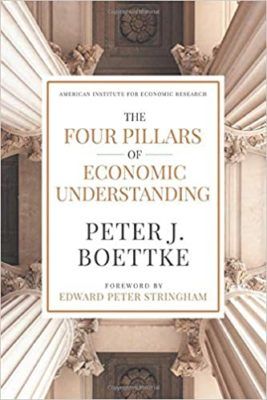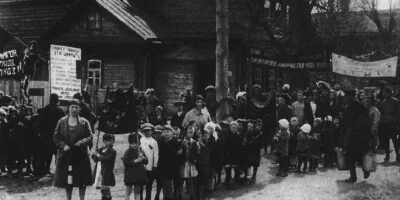The Labeling Problem in Economic Thought
I just returned from teaching at the Cevro Institute’s philosophy, politics, and economics (M.A.) program. This is the second year of this outstanding educational opportunity that Professor Josef Sima initiated. Other professors in the program include Michael Munger (Duke, political science) and David Schmidtz (Arizona, philosophy).
My lectures are part of an interdisciplinary program for advanced study, and I am very persuaded by F.A. Hayek’s warning: “But nobody can be a great economist who is only an economist — and I am even tempted to add that the economist who is only an economist is likely to become a nuisance if not a positive danger.”
My degrees are in economics, my departmental affiliations are in economics, and all of my professional-association memberships are in economics. But what sort of economist am I?
Labels are often useful shorthands, but labels can also confuse and distort. Consider discussions of economists and their various views about the way the world works.
Labels
In the grand scheme of the economics profession, it used to be commonplace to describe various thinkers as “freshwater” and “saltwater” economists. This was after years in which the divide was between “monetarists” and “Keynesians.”
The term “Chicago school economics” was long used as a shorthand for a host of ideological presumptions that were in fact not widely accepted by the thinkers in question. To them, they were just doing price theory, while others were ignoring the lessons of price theory for economic analysis.
On a more personal level, in a critical newspaper account I was labeled a “doctrinaire free market economist.” The source for this label though was myself. When I call myself that, it is normally in the context of showing that even I (a doctrinaire free market economist) see the appeal of some redistributive scheme or interventionist policy.
I usually label myself that way in an effort to demonstrate empathy with a set of values and to force the audience to think about the relationship between means and ends in public policy discourse. Just because we ought to do something, doesn’t mean we can do something, as my friend Steve Horwitz likes to stress. It is not an argument over ends that I am engaging; it is a discussion of the ability of the means chosen to obtain the ends being sought.
Means-ends analysis, where analysts treat ends as given and restrict their investigation to the logic and empirics of the consistency of chosen means (policies) with the given ends, is what positive economics was all about before the confused philosophy of science known as positivism shifted to a more instrumental notion of economic science and practice: “as if” modeling and hypothesis testing. We need to embrace positive economics, just as we must reject the scientism of positivism.
Old-Style Economics
I practice positive economics in this older tradition. That is what I was intellectually raised on under Professor Hans Sennholz at Grove City College, and that is what I was trained to do in graduate school at George Mason University by James Buchanan and Don Lavoie and during my early years as an academic economist working with Israel Kirzner and Mario Rizzo at New York University. Of course, all of these teachers and colleagues understood one could, and perhaps even should, discuss and debate ends, but not when doing economics properly understood. Political economy and social philosophy, in this rendering, emerge as value-relevant disciplines only to the extent that economic science is practiced as a value-neutral discipline to the best that is humanly possible.
A Way of Thinking
From my perspective, there is a core of the economic way of thinking that can be traced from Adam Smith to Vernon Smith and that deals with basic ideas about human rationality, human sociability, and the coordination of activity through time. Incentives, information, and innovation are part of this core as they derive from the even more primordial ideas of property, prices, and profit-and-loss accounting.
We live in a world of scarcity. Scarcity implies that we face trade-offs, and we must hope to negotiate those trade-offs in the most effective way possible. To achieve that negotiating of trade-offs and coordinate our activities with those of others, who are also negotiating trade-offs, we need aids to the human mind. Those aids come in the form of high-powered incentives and clear signals allowing us to engage in economic calculus.
One of the many implications that follows is that demand curves will slope downward and supply curves will slope upward. The shape and the magnitude of the effects that follow from this proposition are empirical matters and largely determined by the array of substitutes available to economic decision-makers. But the essential logic holds from a style of reasoning that attempts to derive the invisible-hand theorem from the rational-choice postulate via institutional analysis.
David Hume’s principles of stability of possession, transference by consent, and the keeping of promises — in other words, property, contract, and consent — provide the institutional infrastructure within which the human pursuit of individual betterment is channeled in commercial life into publicly desirable outcomes (e.g., creating generalized prosperity and making the least advantaged better off).
Again, property, prices, and profit-and-loss accounting give economic actors high-powered incentives and informational signals to allocate resources, time, and effort to the most highly valued uses. They provide constant feedback on whether those allocations are the right ones, and they provide the incentives and information to allow actors to constantly adapt to improve in their decision calculus.
This basic economic calculus applies to all human endeavors, and when we find ourselves outside of the realm of the market sphere of monetary calculation, the question for the analyst is what institutions will provide the same incentives, information, and innovation that property, prices, and profit-and-loss accounting provide in the marketplace. Does electoral politics possess such institutional proxies? Does the bureaucratic organization of public administration? How about philanthropic entities in the nonprofit sector? How do people weigh the marginal costs and marginal benefits of decisions in the different contexts of human interaction?
Economic Perspectives
Nothing about what I have said is “libertarian” or “free market,” but it is economics. Consider, for example, the discussions that have taken place over the past few years on NPR related to paid family leave. The economist in me — not the libertarian or free marketeer, but the economist — kicks in while hearing the story. I want to think about means-ends analysis and the logical consequences of the various proposed means to obtain the desired end, and I want to learn as much empirically as one can from historically analogous policy experience.
I empathize with the ends sought and do not question them in the least. My concern is solely with whether the proposed means would achieve the ends sought and at what cost. This requires recognizing that paid family leave will have its impact on the labor market, and thinking about the impact on the least-advantaged in the labor market (in economic jargon, the marginal employee).
It is at this point that I think not only of basic economics as taught by Henry Hazlitt in Economics in One Lesson or Hans Sennholz in The Politics of Unemployment, but more advanced economic analyses of labor markets such as Casey Mulligan’s in The Redistribution Recession. Mulligan’s basic point is that if through public policy you simultaneously raise the costs of hiring individuals and lower the costs to individuals of being unemployed, then you shouldn’t be surprised by a sluggish labor market that hampers the ability of individuals to climb the economic ladder and increase their income.
Throughout the past few years, in talks in Asia, Europe, and the United States, I have stressed three problems I believe U.S. economic policy makers are going to have to face up to. Otherwise, the problems in the economy will become worse and the tensions in our society will be accentuated rather than ameliorated. The problems are (1) the intergenerational fiscal gap, (2) the exit strategy of the Fed since the extraordinary measures post-2008, and (3) the structural inequality that is evident throughout the United States.
From my perspective, all three are interrelated and tied to a period of more than sixty years of the “economics of illusion” that has been pursued in U.S. and European economic policy since World War II. In this reading, (3) is not due to some fundamental law of capitalism, but instead to the political restrictions that grant privileges to a few at the expense of the many.
The U.S. system has become more connection-based, rather than contract-based, as promissory politics has substituted for politics bound by general principles. But what if the very social ills we see before us are due not to malfeasance but the logic of individual decision-making within the institutional context so reorganized?
The same style of reasoning that explains why individuals pursuing their self-interest can produce publicly desirable outcomes such as productive specialization and peaceful social cooperation within the specific institutional context of property, contract, and consent also explains why that pursuit of self-interest in other institutional contexts, such as ordinary electoral politics or bureaucratic management in the public sector, results in social tragedies and social tensions.
That is economics, not libertarianism or even free market politics, pursued persistently and consistently. Unless we get away from the habits of labeling folks and arguments to pigeonhole them and of disregarding our intellectual culture, we will continue to fail to understand what is causing the social ills that plague us, let alone come to engage in creative thinking about how to address these social ills. That would be tragic on so many dimensions.












